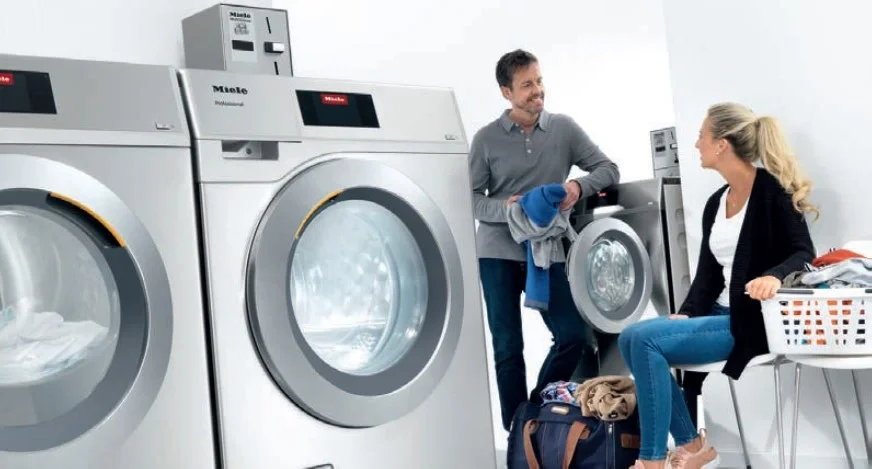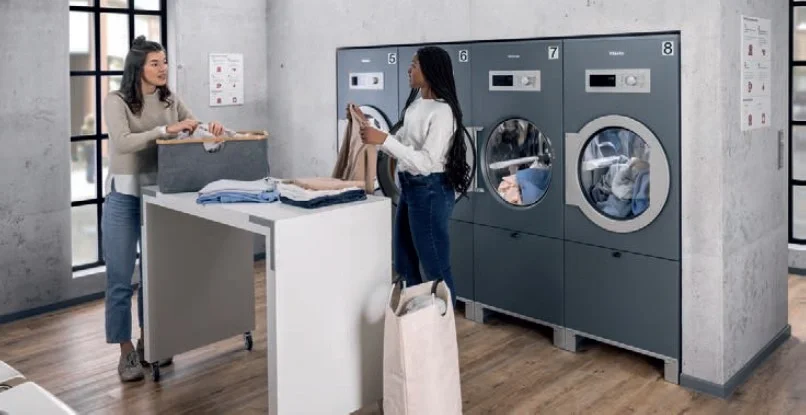
The Scandinavian laundry and dry cleaning market is steadily growing these days thanks to maintaining stable demand for the industry’s services and improved local economies. Despite the ongoing Russian/ Ukrainian war and associated negative consequences for the economies of all the Scandinavian states (Sweden, Norway, Denmark, Iceland and Finland), as of now their textile care sectors have reached pre-pandemic levels and even exceeded them.
According to the Swedish Textile Services Association’s (Sveriges Tvätteriförbund) Daniel Kärrholt, despite the fact that the industry has almost completely recovered from the pandemic and energy crisis, there is still a number of problems, which prevents more active growth.
Kärrholt comments: “In regard to Sweden, these are still very challenging times even if the industry turnover has passed the pre-pandemic level. As shown in our latest industry report based on the annual reports of 2022, the turnover was nearly SEK 6 Billion (US$482 million). Optimism is back in several customer segments – not only in the hospitality sector.”
According to Kärrholt, a further development of the industry in Sweden will primarily depend on the level of customer activities and demand. Almost the same situation is observed in other countries of the region, which in recent years have almost faced with deterioration of economics and high inflation rates with Norway being primarily the most affected.
Local analysts and market players reckon the generally high level of maturity and a high level of competition (with low consolidation) have always been among the main features of the Scandinavian market of laundry and drycleaning services . In recent years there has been also significant growth of demand for innovation and a switch towards sustainability concepts.
The Scandinavian market is on the radar of the global majors, many of which have strengthened their positions in the region in recent years, planning their further development in this promising market. An example is Alliance Laundry Systems, which has traditionally considered the Scandinavian region as one of the most important for its growth in the European region.

As Jean-Baptiste Van Damme, vice president sales Europe at Alliance Laundry Systems told LCNi, several significant advances have been made by the company in the laundry sector in Scandinavia. “Key achievements aimed at improving efficiency, sustainability, and quality laundry processes. We are increasingly focused on reducing environmental impacts and enhancing the quality and traceability of our products. With our distribution network in the region we are fully equipped to guarantee the use of our products in the sector as well as the best service. Focusing on a customised product for the region was a great success delivered through our main partners. As for future expansion plans in Scandinavia, the industry shows a strong commitment to continuous innovation and market growth. Events such as Texcare International 2024 serve as platforms for sharing knowledge, showcasing new technologies, and fostering collaborations that drive the industry forward.”
According to Van Damme, the Scandinavian textile care market is poised for further growth and development, with a clear emphasis on sustainability and technological innovation. In this regard, according to predictions form Van Damme, the market will grow further in years to come.
Van Damme continues: “The demand for laundry in the Scandinavian region is expected to grow in the coming years. This growth is driven by several factors, including increasing urbanisation, a rising number of working professionals, and a growing preference for convenience and professional cleaning services due to time constraints and hygiene concerns. As more people move to urban areas and lead busier lifestyles, the need for professional laundry and drycleaning services is increasing. The convenience of these services is particularly appealing to working professionals who may not have the time to do laundry Innovations in laundry technology, such as smart laundry machines and cashless payment systems, are enhancing the efficiency and appeal of professional laundry services. These advancements are expected to continue driving market growth.”
In the meantime, another global manufacturer, Germany’s Miele Professional also puts big hopes on its development in the Scandinavian region, with a particular focus on its residential sector. Carole Chagnon, head of Miele Professional’s marketing North West Europe for laundry care tells LCNi: “The importance of residential/social laundry rooms is a very specific key segment in all Scandinavian countries. Miele Professional wants to strengthen its position there by offering a complete dedicated solution to meet this specific demand, with specific laundry equipment from 6 kg to 32 kg as well as detergents, services and digital solutions for booking, payment and passage systems.”
Miele Professional offers its own process chemicals under the ‘ProCare Tex’ label, which are ideal for use in its own commercial washing machines of all sizes. Due to their environmentally friendly composition, some detergents are labelled with the EU Ecolabel ‘Euroblume’.
At the same time Kannegiesser sees a trend for smaller laundries gaining popularity in the Scandinavian region, and is considering accelerating expansion in this market segment. A spokeswoman for Kannegiesser commented: “In the Nordic region at present Kannegiesser is gaining market shares with the municipally-owned laundries where people with challenges in regular working life are employed. We see a trend of smaller laundries being established to avoid long transport routes. We are working on hiring more technicians who are based in the country’s largest cities. This will reduce travel costs and CO2 emissions and improve service response times. This is also a point that aligns with the challenges we face in our vast and sparsely populated country, where we depend on flights to reach our customers. This, in turn, will help us increase our market share with the smaller laundries, nursing homes, and so on, due to local presence.”
Despite the existing challenges, Kannegiesser expects the Scandinavian textile care sector will be growing in years to come, that will provide an opportunity to leading local players for a further growth.
“Yes, we see it is growing year by year. We see higher demands for healthcare textiles because our population is getting older and living longer, and a growing tourism business will increase the demand for laundry in the future.
For example, in case of Norway, the major challenges for our industry in this country are increased interest rates and a weak Norwegian currency, making investments harder to carry for the Norwegian laundries. The difference in the last 10 years is an increase of more than 30%.
“In addition to the above-mentioned travel distances causing high costs for our customers, we are now possibly facing strict environmental regulations. Among them, we will probably have a ban on using fossil energy in every industry from 2030. Then steam needs to be produced by electricity, but this will not be possible for energy demanding industries, because the power grid and supply of large amounts of electric current aren’t available in most of these locations, and it will take years to facilitate.”
In the meantime, Alliance’s Van Damme also considers the ever tightening environmental regulations in the region as a significant challenge for the company, along with market saturation and strong competition. ‘We face major challenges like environmental concerns, competition and market saturation. Our company will need to navigate these challenges through innovation, sustainability initiatives and strategic expansions to maintain and enhance our market position.”

In regard of future prospects, most operators believe the HORECA segment will provide additional opportunities for growth during the period of 2024-2025.
Van Damme adds the growth of the hospitality industry, including hotels and restaurants, is contributing to increased demand for commercial laundry services. “These establishments require frequent and high-quality laundry services, further boosting the market».”
The same position is shared by independent analysts, according to Kärrholt from Swedish TCA, the level of activity in thethe customer segments will be also an important factor for a further dynamics of the industry.
Kärrholt continues: “As for Sweden, we are also still hopeful that the RUT-reform of 2021, ie, that the private customer get 25 % tax deduction on their household laundry that is professionally washed in water could provide an impetus for the more active growth of the industry in years to come.”






